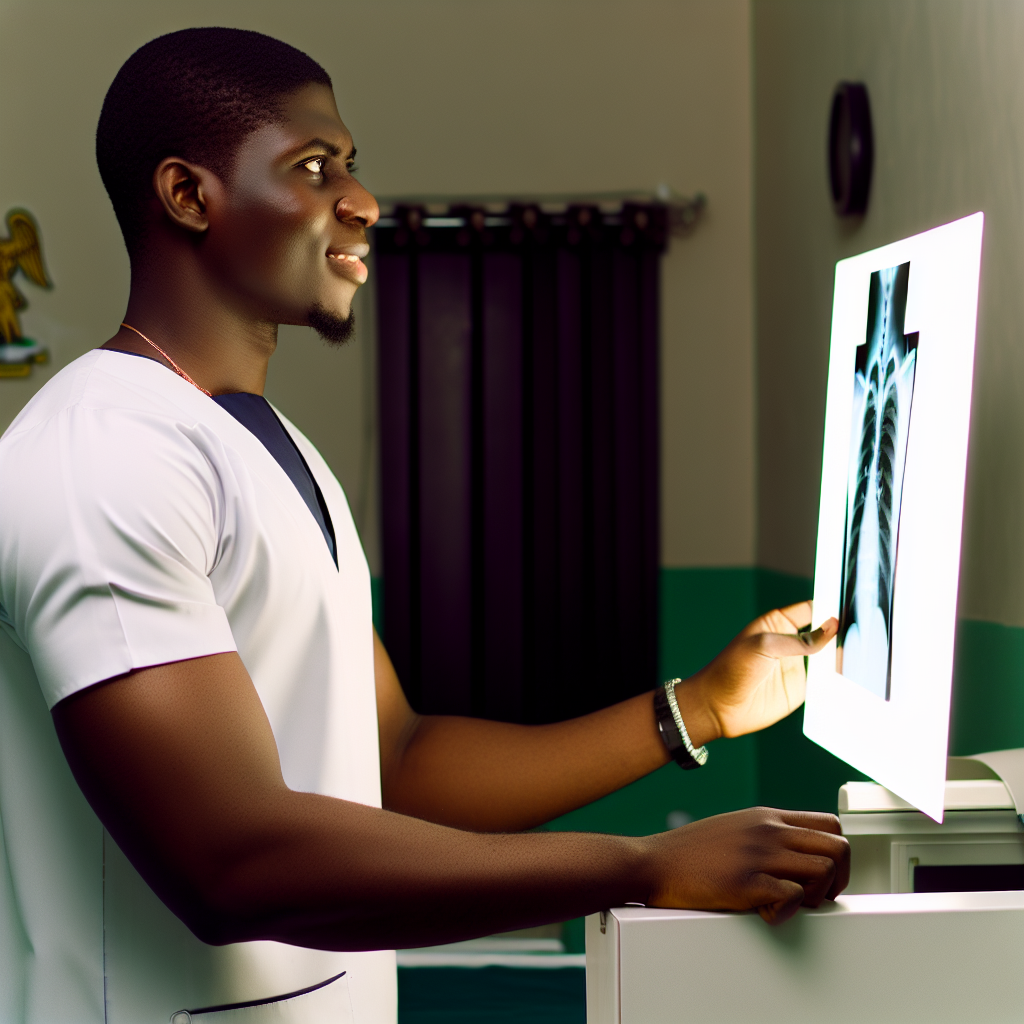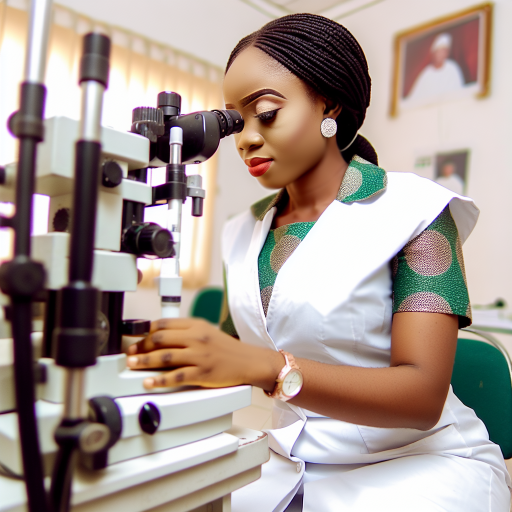Introduction:
Radiographers play a crucial role in the Nigerian healthcare system by providing accurate diagnostic imaging services.
They are highly skilled professionals who operate imaging equipment to produce images used for diagnosing illnesses and injuries.
Radiographers in Nigeria undergo rigorous training and education to ensure they are proficient in their field.
Their expertise is essential in providing doctors with the information needed to make accurate diagnoses and treatment plans.
Without radiographers, the healthcare system in Nigeria would struggle to effectively diagnose and treat patients.
Role of Radiographers in Diagnostic Imaging
Radiographers play a crucial role in the field of diagnostic imaging in Nigeria.
They are highly trained professionals who are responsible for operating imaging machinery to help diagnose medical conditions.
Radiographers perform a variety of tasks that are essential for providing accurate and reliable results for patients.
One of the primary responsibilities of radiographers is conducting various imaging procedures such as X-rays, MRIs, CT scans, and ultrasounds.
These imaging techniques are vital for identifying and diagnosing a wide range of medical conditions, from broken bones to internal organ issues.
Radiographers use their expertise to ensure that the imaging process is done correctly and safely.
In addition to performing imaging procedures, radiographers are also trained to interpret the results of these scans.
They work closely with radiologists and other healthcare professionals to analyze the images and provide detailed reports on their findings.
This interpretation is crucial for accurately diagnosing medical conditions and determining the best course of treatment for patients.
Furthermore, radiographers play a key role in assisting in diagnosing medical conditions.
By conducting imaging scans and interpreting the results, radiographers help physicians identify and understand the extent of a patient’s condition.
This information is essential for creating treatment plans and monitoring the progress of patients throughout their medical care.
The role of radiographers in diagnostic imaging is indispensable in the Nigerian healthcare system.
Their expertise and skills are essential for providing accurate and reliable imaging results that are vital for diagnosing and treating various medical conditions.
Radiographers play a critical role in ensuring that patients receive the best possible care and treatment based on their imaging results.
Training and Qualifications of Radiographers in Nigeria:
Radiographers in Nigeria are required to complete a Bachelor’s degree in Medical Radiography from a recognized university.
The program typically takes four to five years to complete and includes both theoretical coursework and clinical training.
Students learn about anatomy, physiology, radiographic techniques, patient care, and radiation safety during their studies.
After completing their degree, radiographers may choose to pursue further specialization through postgraduate studies or certifications.
Licensing and Certification Process:
Upon graduation, radiographers must obtain a license from the Radiographers Registration Board of Nigeria (RRBN) to practice legally.
The licensing process involves submitting proof of education, passing a registration examination, and paying the required fees.
Additionally, radiographers may choose to pursue certification from professional bodies such as the Nigerian Institute of Radiography (NIR).
Obtaining certification demonstrates a radiographer’s commitment to continuing education and high standards of practice.
Continuous Professional Development:
In order to maintain their license and certification, radiographers are required to participate in continuous professional development activities.
This may include attending conferences, workshops, and seminars to stay current on the latest advancements in medical imaging technology.
Radiographers may also choose to pursue advanced certifications or additional qualifications to enhance their skills and expertise.
Engaging in continuous professional development is essential for radiographers to provide quality care and stay competitive in the field.
Learn More: Challenges Facing Anatomical Pathology in Nigeria
Challenges faced by radiographers in Nigeria:
Limited resources and equipment in healthcare facilities: Radiographers in Nigeria often face challenges due to inadequate resources and outdated equipment in healthcare facilities.
This can impact the quality of imaging services provided to patients and hinder the accurate diagnosis of medical conditions.
High patient load and long working hours: Radiographers in Nigeria are often required to work long hours and handle a high volume of patients on a daily basis.
This can lead to fatigue, burnout, and decreased job satisfaction among radiographers, affecting their overall performance and patient care.
Need for more skilled radiographers in rural areas: There is a shortage of skilled radiographers in rural areas of Nigeria, where access to healthcare services is limited.
This poses a challenge in providing timely and quality radiography services to residents in these underserved areas, impacting the overall healthcare outcomes.
You Might Also Like: Radiology Safety Protocols in Nigerian Clinics
Transform Your Career with Expert Guidance
Get personalized mentorship consulting that’s tailored to your unique path. Our expert advice is actionable and exclusive.
Get StartedRadiographers play a crucial role in the healthcare system in Nigeria.
Their impact on patient care is evident through various aspects:
Improving accuracy of diagnosis
- Radiographers are trained to capture high-quality images that aid in the accurate diagnosis of various medical conditions.
- They ensure that imaging procedures are performed correctly, leading to more precise diagnoses by healthcare professionals.
- By producing clear and detailed images, radiographers help identify health issues early, improving patient outcomes.
Ensuring patient safety during imaging procedures
- Radiographers prioritize patient safety by following strict protocols and guidelines during imaging exams.
- They shield patients from unnecessary radiation exposure and ensure that imaging equipment is properly calibrated.
- Through their expertise, radiographers minimize risks associated with imaging procedures, prioritizing the well-being of patients.
Collaborating with other healthcare professionals for holistic care
- Radiographers work closely with radiologists, physicians, and other healthcare professionals to provide comprehensive care to patients.
- They communicate findings from imaging exams effectively, contributing valuable information to the overall patient care plan.
- By collaborating with different team members, radiographers ensure that patients receive integrated and personalized care.
Radiographers have a profound impact on patient care in Nigeria by improving diagnosis accuracy, prioritizing safety during procedures, and collaborating with other healthcare professionals for holistic care.
Their expertise and dedication significantly enhance the quality of healthcare delivery in the country.
You Might Also Like: How to Prepare for Anatomy Exams in Nigerian Universities

Technological advancements in radiography in Nigeria:
With the rapid advancement of technology in the medical field, radiographers in Nigeria have been able to enhance the quality of patient care and diagnosis through the adoption of cutting-edge technologies.
Some of the key technological advancements in radiography in Nigeria include:
Introduction of digital imaging technology:
One of the most significant advancements in radiography in Nigeria is the transition from traditional film-based imaging to digital imaging technology.
Digital radiography allows for faster image acquisition, better image quality, and reduced radiation exposure for patients.
Radiographers in Nigeria have embraced this technology, which has revolutionized the way diagnostic images are captured, stored, and viewed.
Use of tele-radiology for remote diagnosis:
Tele-radiology is another technological advancement that has had a profound impact on radiography in Nigeria.
This technology allows radiologists and radiographers to remotely transmit and interpret diagnostic images, enabling faster diagnosis and treatment of patients in remote or underserved areas.
The use of tele-radiology has helped to bridge the gap in access to diagnostic services in Nigeria, particularly in rural areas where there is a shortage of radiologists.
Training on new equipment and techniques:
In order to effectively utilize the latest advancements in radiography technology, radiographers in Nigeria undergo continuous training on new equipment and techniques.
Training programs are designed to ensure that radiographers are well-versed in the operation of advanced imaging equipment and are able to adapt to evolving imaging techniques.
This continuous training is essential for maintaining high standards of patient care and ensuring optimal outcomes in diagnostic imaging.
Technological advancements in radiography in Nigeria have significantly improved the quality and efficiency of diagnostic imaging services.
The introduction of digital imaging technology, the use of tele-radiology for remote diagnosis, and ongoing training on new equipment and techniques have positioned radiographers in Nigeria as key players in the provision of high-quality healthcare services.
As technology continues to advance, radiographers in Nigeria will continue to play a crucial role in delivering accurate and timely diagnostic imaging services to patients across the country.
Discover More: Microbiology Journals and Publications in Nigeria
Contributions of Radiographers to Research and Innovation:
– Participating in clinical trials and studies: Radiographers play a crucial role in conducting and assisting with various clinical trials and studies.
They are responsible for capturing high-quality images that are essential for research purposes.
– Developing new imaging techniques: Radiographers are at the forefront of developing and implementing new imaging technologies.
They work closely with other healthcare professionals to improve diagnostic imaging methods and enhance patient care.
– Contributing to evidence-based practice in healthcare: Radiographers are vital in providing evidence-based practice in healthcare.
By utilizing their expertise in imaging technology, they help in making informed decisions for patient care and treatment planning.
Radiographers’ Role in Nigerian Medicine
Radiographers play a critical role in Nigerian medicine by providing essential diagnostic imaging services.
It is evident that radiographers are indispensable members of the healthcare team.
They aid in accurate diagnosis and treatment planning.
Therefore, there is a pressing need for increased support and recognition for radiographers in Nigeria.
This support is vital to elevate their status in the medical field.
By investing in radiography education and resources, the healthcare system can ensure better outcomes for patients.
Overall, this will lead to improved quality of care.
Additional Resources
Musculo-skeletal Symptoms and Its Severity among Radiographers …
Knowledge, attitudes and practice of breast cancer screening …




